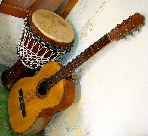
Jorge Andrés Herrera, an adjunct professor at California State University – Fullerton, says that music plays an important role in shaping Latino identity, and can transform and affect Latino culture.
Herrera, who teaches Chicano Studies courses and is a Ph.D. candidate at UCLA, studies ethnomusicology, the study of how music influences and affects culture, and he is using his knowledge to focus on further studying the role music plays in shaping Latino identity with an emphasis on the U.S./Mexico border.
“When you cross the border from Mexico to the United States, music becomes more politicized and is usually used as a vehicle to express ideologies about life, about culture, relationships and life in general,” says Herrera. “But, if you cross the border from the United States to Mexico, it has more of an entertainment, traditional and regional value.”
He first noticed the differences while at college, when he noticed how his Latino friends – specifically Mexican ones – thought about music and how it helped define who they were while living in the U.S. When those same friends began to take the Chicano studies courses, he saw that they began to learn about their culture, history and roots.
Herrera believes music helps shape Latino identity by empowering and helping those who have assimilated to mainstream music in the United States and reconnect with their true selves.
“I believe there is a strong need and sense for Latinos to reclaim their heritage,” he says. “Too many times, we have read our history books that have been written by Europeans and it has had a tremendous impact in the ways we view our culture and listen to our music. I do think our identity is lost with it and at some point, we try to find it again later in life.”
Even with music assisting in identity-building, Herrera says that Latinos are becoming more accepting of who they are and where they come from, despite comparisons made among one another.
“I think we are finally coming to terms with who we are,” says Herrera. “We are beginning to embrace our biculturalness, the fact that we can listen to English music and Spanish music and still identify.”

Recent Comments